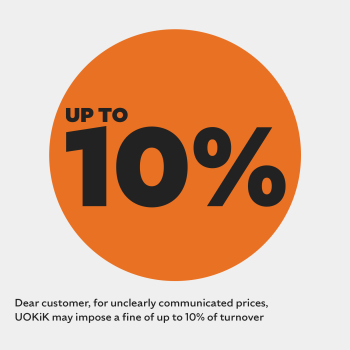
- How much does a head of lettuce cost? Where can I find the lowest price from 30 days before the reduction when buying sausages? How much do I save when buying three packs of butter?
- President of UOKiK brings charges. For unclear pricing Jeronimo Martins Polska faces a penalty of up to 10% of its turnover.
- Three managers also face charges and could be fined up to PLN 2 million.
UOKiK’s actions were based on reports from consumers who described various irregularities during promotional campaigns run by the Biedronka chain. Customers complained in particular about difficulties in identifying the correct price when purchasing items under a multi-buy offer, as well as about the information on the lowest prices from 30 days before the reductions being displayed in an illegible manner, including the use of fonts that were too small. As part of the verification of the implementation of the Omnibus Directive and the investigation of retail chains, the Trade Inspection Authority, subordinated to UOKiK, also carried out inspections in Biedronka stores. Inspectors collected extensive photographic documentation, primarily of price labels and signs displaying price reductions offered to consumers. Analysis of the evidence confirmed the reported irregularities. The President of UOKiK, Tomasz Chróstny, has charged Jeronimo Martins Polska with violating the collective interests of consumers.
– When shopping, price is a key factor for consumers – some choose the cheapest products, while others consider the price–quality ratio. In both cases, consumers need clear information about the final price of a product in order to make an informed and rational decision. However, the price labels contained information that was misleading or illegible to consumers. Therefore, I am charging the company and its managers with violating fundamental consumer rights concerning price information. This is also a clear signal to other market participants not to create ambiguous, overly complicated, and therefore misleading price reductions, explains Tomasz Chróstny, President of UOKiK.
Don’t approach without a magnifying glass and a calculator…
Popular multi-buy offers are based on the principle of reducing the price per product when the consumer purchases a certain number of items. It is possible to buy a single item, but this means paying the regular price, without the promotion. If the retailer is honest, the mechanism for calculating the benefit is quite simple – the consumer knows the price of a single product and can see how much they save by buying a set of several items. Biedronka offered various multi-buy combinations, including price reductions according to the X+Y free scheme, i.e. for example 1+1 free. The promotions covered various product groups, including butter, sweets, vegetables, and fruit. One consumer describes how these reductions looked in practice in shops in one of the hundreds of complaints received by UOKiK – I am filing a complaint against the Biedronka chain of shops, which, in my opinion, misrepresents the prices of its products. In particular, I am referring to the phrase 1+1 FREE, as shown in the photo below.

When viewing this price from a distance of about one metre, the information 1+1 FREE and the price of PLN 3.00 are immediately noticeable. To me, this suggests that one lettuce costs PLN 3, while the second one is free. However, upon reading the text carefully, it turns out that one lettuce actually costs PLN 5.99, and the second one is free. As a consumer, I am asking UOKiK to intervene in this matter.
When calculating the cost of promotional product sets at Biedronka, consumers were guided by the displayed price. This is evident from the complaints received. However, for the company, the base price for calculations was the regular price, printed in small print in the lower-left corner of the label. In the case of lettuce, according to one of the complaints, this amount was PLN 5.99. The displayed price did not reflect the information contained in the promotion name, as it represented the unit price that applied only when purchasing two items. Consumers therefore had to multiply this price by two or three, depending on the terms of the discount, in order to determine the actual amount to be paid for the entire set.
– This is just one example of the thousands of price labels for various products that consumers may encounter in the Biedronka chain. The company uses various promotional mechanisms, such as: “Second item 50% off when you buy 2”, “22% off when you buy 3”, “2+1 free”, or simply “40% off”. These practices confuse consumers and make it difficult for them to calculate the actual price benefit they would receive. Customers also complained that this presentation of information prevents them from knowing the price per item. This, in turn, makes it difficult to compare prices and offers, including those from other chains. We are in favour of products being offered at favourable prices, but information about discounts should be presented in a simple and clear manner – explains Tomasz Chróstny, President of UOKiK.
Interpretations of the terms and conditions of discounts presented on price labels vary depending on whether they are made by the company or by consumers. After reviewing their receipts, customers indicate in their complaints that such presentation of the price reduction conditions is misleading. The President of UOKiK shares this opinion and has therefore charged the company with violating the collective interests of consumers. The collected material allows us to conclude that this was an ongoing practice for many months across all Biedronka stores. It was not a matter of a one-off promotion or mistakes made by employees of individual stores.
False discounts and invisible lowest prices
The President of UOKiK has also charged the company with misleading consumers by incorrectly calculating discount amounts. According to materials collected by the President of UOKiK, in the case of many products, discounts are calculated based on the regular price rather than the lowest price in the previous 30 days. This practice may create the impression that the offer is more attractive. It can also result in situations where the allegedly reduced price of a product is higher than the price that applied during the 30 days preceding the supposed price reduction. According to the President of UOKiK, presenting a discount in this way is an example of a so-called false discount. It misleads consumers by providing inaccurate information about the actual size of the discount. The President’s position has been presented on numerous occasions, most notably in explanations issued in 2023, which are available in Polish on the UOKiK website. It was also confirmed by the Court of Justice of the European Union in September 2024 in its ruling C 330/23. The President of UOKiK also has reservations about the way in which the lowest price applicable in the 30 days prior to the reduction was presented. Both its location on the display – at the very bottom of the price label – and the small font make this important information illegible to consumers.
For each of the three allegations, the company may be fined up to 10 per cent of its turnover.
The manager is also liable
Not only the company, but also the person in charge of its management may be punished for breaking the law. A situation in which the president, manager, or director deliberately allows the company to violate applicable regulations may cost them up to PLN 2 million. In the case of the Biedronka chain, the evidence gathered so far has led to charges being brought against three individuals – members of the company’s management board. As determined by the President of UOKiK, the price labels used were not the result of individual actions by employees at a specific Biedronka store. The appearance and content of price labels are determined centrally at the company’s headquarters, where the management board is responsible for supervising and approving such processes. This is one of the main ways of reaching consumers with information and persuading them to purchase products or take advantage of discounts.
UOKiK’s Omnibus measures
Since the beginning of 2023, the President of UOKiK has been monitoring how businesses have adapted to the requirements for displaying prices on discounted products. At the request of UOKiK, the Trade Inspection Authority has been inspecting, among others, grocery chains, checking on an ongoing basis that price displays comply with the Omnibus Directive.
– We are seeing many positive changes. There is already case law from Polish administrative courts, which also hear cases brought by the Trade Inspection Authority, which is subordinate to us. We are currently conducting seven proceedings in which charges have been brought against the companies Zalando, Media Markt, Sephora, Glovo, Shell Polska, AzaGroup, and Temu. In connection with the incorrect presentation of information about discounts, we have issued over 70 soft calls, and seven investigations are pending in relation to brick-and-mortar stores, including the grocery chains Aldi, Dino, Lidl, and Żabka – explains President of UOKiK, Tomasz Chróstny.
The judgment of the Court of Justice of the European Union in the ALDI SÜD case (C 330/23) confirms the approach of the President of UOKiK. The CJEU clearly states that price reductions must be calculated in relation to the “previous price”, i.e., the lowest price applied during at least 30 days prior to the reduction. A discount, where the selling price is higher than the lowest price in the previous 30 days, is not a true discount, and a trader who presents it in this way is breaking the law.
The purpose of this minimum 30-day reference period is to prevent businesses from manipulating prices and presenting misleading reductions – for example, temporarily raising the price and then lowering it, presenting it as a significant discount, which deceives consumers.
Information for the media
| +48 603 124 154 | |
| biuroprasowe@uokik.gov.pl | |
 | pl. Powstańców Warszawy 1 00-950 Warszawa |
Follow us
Help for consumers
| 801 440 220 | +48 222 66 76 76 operator fee | |
| poradydlakonsumentow.pl contact form | |
 | Consumer Ombudsmen in your town or district |
 | Trade Inspection in your province |














